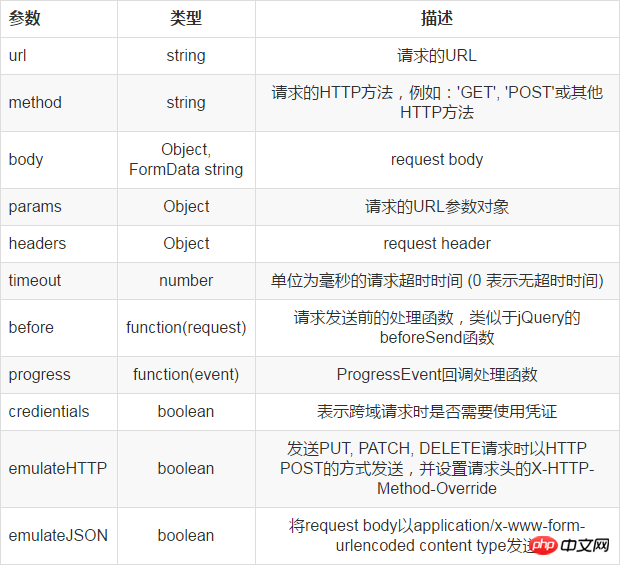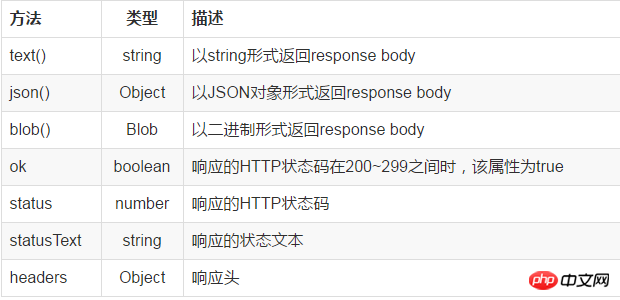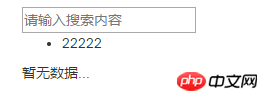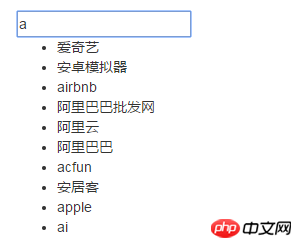VUE中如何使用Vue-resource完成交互
本篇文章主要介绍了VUE中使用Vue-resource完成交互,内容挺不错的,现在分享给大家,也给大家做个参考。
本文介绍了VUE中使用Vue-resource完成交互,分享给大家,具体如下
使用vue-resource
引入vue-resource
vue-resource就像jQuery里的$.ajax,是用来跟后端交互数据的,vue-resource是vue的一个插件,所以我们在开始使用vue之前,需要先引入vue-resource.js这个文件
<script src='js/vue.js'></script> <script src='js/vue-resource.js'></script>
基本语法
// 基于全局Vue对象使用http Vue.http.get('/someUrl', [options]).then(successCallback, errorCallback); Vue.http.post('/someUrl', [body], [options]).then(successCallback, errorCallback); // 在一个Vue实例内使用$http this.$http.get('/someUrl', [options]).then(successCallback, errorCallback); this.$http.post('/someUrl', [body], [options]).then(successCallback, errorCallback);
在发送请求后,使用then方法来处理响应结果,then方法有两个参数,第一个参数是响应成功时的回调函数,第二个参数是响应失败时的回调函数。
options对象

实例:
GET请求
在下面的实例中,我们做一个求和的功能,效果如下图:

get方法:
this.$http.get('/someUrl', [options]).then(function(response){
// 响应成功回调
}, function(response){
// 响应错误回调
});在该实例中,我们准备了一个php文件,该文件主要接收前台通过get传过来的参数,并计算两个参数的和,代码如下:
<?php $a=$_GET['a']; $b=$_GET['b']; echo $a+$b; ?>
html代码:
<p class="container" id="box" style="margin-top:100px"> <input type="text" name="" id="" v-model="a" />+ <input type="text" name="" id="" v-model="b" /> = <input type="button" value="求和" class="btn btn-info" @click="add()"/> </p>
<script type="text/javascript">
new Vue({
el:"#box",
data:{
a:"",
b:""
},
methods:{
add:function(){
this.$http.get("get.php",{
"a":this.a,
"b":this.b
}).then(function(response){
alert(response.data)
},function(response){
alert(response.status)
}
)
}
}
})
</script>说明:response是后台返回的参数,它包括以下属性:

POST请求
<?php $a=$_POST['a']; $b=$_POST['b']; echo $a+$b; ?>
new Vue({
el:"#box",
data:{
a:"",
b:""
},
methods:{
add:function(){
this.$http.post("post.php",{
"a":this.a,
"b":this.b
},{
emulateJSON:true //POST请求需要将emulateJSON设置为true
}).then(function(response){
alert(response.data)
},function(response){
alert(response.status)
}
)
}
}
})JSONP
jsonp的语法跟get,post差不多,只是传递的数据不一样。接下来,我们用jsonp来完成一个百度搜索的功能。
1.首先准备一个实例的接口,这个接口是百度的搜索接口(我们可以自己找一些接口作为测试),如下:
https://sp0.baidu.com/5a1Fazu8AA54nxGko9WTAnF6hhy/su?wd=a&cb=show
2.准备布局
<p class="container" id="box" style="margin-top:100px">
<input type="text" placeholder="请输入搜索内容" />
<ul>
<li >22222</li>
</ul>
<p >暂无数据...</p>
</p>
3.功能描述
当我们在搜索框中输入搜索的内容的时候,下面的列表会显示出根据我们输入的内容联想的词语。按键盘的上下键,可以上下选择列表中的词语,按enter键的时候,会执行搜索
4.代码实现
首先我们准备一个myData数组,存放联想的词语。t1是input框输入的值,如下
<input type="text" placeholder="请输入搜索内容" v-model="t1" />
data:{
myData:[],
t1:""
}在搜索框中的输入内容的时候,执行一个方法,这个方法主要用于发送一个请求,获取输入内容的联想词语。
<input type="text" placeholder="请输入搜索内容" v-model="t1" @keyup="search()"/>
methods:{
search:function(ev){this.$http.jsonp("https://sp0.baidu.com/5a1Fazu8AA54nxGko9WTAnF6hhy/su",{
"wd":this.t1
},{
jsonp:"cb" //callback名字,默认是callback
}).then(function(response){
this.myData=response.data.s
},function(response){
alert(response.status)
}
)
}
}执行到这一步,列表中已经可以显示出我们搜索的联想词语了,如下图:

下面的我们可以实现,按上下键的时候,选择词语
<p class="container" id="box" style="margin-top:100px">
<input type="text" v-model="t1" @keyup="search($event)" @keydown.down.prevent="changeDown($event)" @keydown.up.prevent="changeup()"/>
<ul>
<li v-for="(value, index) in myData" :class="{gray:index==now}">{{value}}</li>
</ul>
<p v-show="myData.length==0">暂无数据...</p>
</p>/*data数据*/
data:{
myData:[],
t1:"",
now:-1
}
/*上下键的方法*/
changeDown:function(){
this.now++;
if(this.now==this.myData.length){
this.now=-1;
}
this.t1=this.myData[this.now];
},
changeup:function(){
this.now--;
if(this.now==-2){
this.now=this.myData.length-1;
}
this.t1=this.myData[this.now];
}完整代码:
初识vue
<p class="container" id="box" style="margin-top:100px">
<input type="text" v-model="t1" @keyup="search($event)" @keydown.down.prevent="changeDown($event)" @keydown.up.prevent="changeup()"/>
<ul>
<li v-for="(value, index) in myData" :class="{gray:index==now}">{{value}}</li>
</ul>
<p v-show="myData.length==0">暂无数据...</p>
</p>
以上就是本文的全部内容,希望对大家的学习有所帮助,更多相关内容请关注PHP中文网!
相关推荐:
以上是VUE中如何使用Vue-resource完成交互的详细内容。更多信息请关注PHP中文网其他相关文章!

热AI工具

Undresser.AI Undress
人工智能驱动的应用程序,用于创建逼真的裸体照片

AI Clothes Remover
用于从照片中去除衣服的在线人工智能工具。

Undress AI Tool
免费脱衣服图片

Clothoff.io
AI脱衣机

AI Hentai Generator
免费生成ai无尽的。

热门文章

热工具

记事本++7.3.1
好用且免费的代码编辑器

SublimeText3汉化版
中文版,非常好用

禅工作室 13.0.1
功能强大的PHP集成开发环境

Dreamweaver CS6
视觉化网页开发工具

SublimeText3 Mac版
神级代码编辑软件(SublimeText3)

热门话题
 vue.js怎么引用js文件
Apr 07, 2025 pm 11:27 PM
vue.js怎么引用js文件
Apr 07, 2025 pm 11:27 PM
在 Vue.js 中引用 JS 文件的方法有三种:直接使用 <script> 标签指定路径;利用 mounted() 生命周期钩子动态导入;通过 Vuex 状态管理库进行导入。
 vue中的watch怎么用
Apr 07, 2025 pm 11:36 PM
vue中的watch怎么用
Apr 07, 2025 pm 11:36 PM
Vue.js 中的 watch 选项允许开发者监听特定数据的变化。当数据发生变化时,watch 会触发一个回调函数,用于执行更新视图或其他任务。其配置选项包括 immediate,用于指定是否立即执行回调,以及 deep,用于指定是否递归监听对象或数组的更改。
 vue怎么给按钮添加函数
Apr 08, 2025 am 08:51 AM
vue怎么给按钮添加函数
Apr 08, 2025 am 08:51 AM
可以通过以下步骤为 Vue 按钮添加函数:将 HTML 模板中的按钮绑定到一个方法。在 Vue 实例中定义该方法并编写函数逻辑。
 vue中怎么用bootstrap
Apr 07, 2025 pm 11:33 PM
vue中怎么用bootstrap
Apr 07, 2025 pm 11:33 PM
在 Vue.js 中使用 Bootstrap 分为五个步骤:安装 Bootstrap。在 main.js 中导入 Bootstrap。直接在模板中使用 Bootstrap 组件。可选:自定义样式。可选:使用插件。
 vue返回上一页的方法
Apr 07, 2025 pm 11:30 PM
vue返回上一页的方法
Apr 07, 2025 pm 11:30 PM
Vue.js 返回上一页有四种方法:$router.go(-1)$router.back()使用 <router-link to="/"> 组件window.history.back(),方法选择取决于场景。
 Vue 实现跑马灯/文字滚动效果
Apr 07, 2025 pm 10:51 PM
Vue 实现跑马灯/文字滚动效果
Apr 07, 2025 pm 10:51 PM
在 Vue 中实现跑马灯/文字滚动效果,可以使用 CSS 动画或第三方库。本文介绍了使用 CSS 动画的方法:创建滚动文本,用 <div> 包裹文本。定义 CSS 动画,设置 overflow: hidden、width 和 animation。定义关键帧,设置动画开始和结束时的 transform: translateX()。调整动画属性,如持续时间、滚动速度和方向。
 vue懒加载什么意思
Apr 07, 2025 pm 11:54 PM
vue懒加载什么意思
Apr 07, 2025 pm 11:54 PM
在 Vue.js 中,懒加载允许根据需要动态加载组件或资源,从而减少初始页面加载时间并提高性能。具体实现方法包括使用 <keep-alive> 和 <component is> 组件。需要注意的是,懒加载可能会导致 FOUC(闪屏)问题,并且应该仅对需要懒加载的组件使用,以避免不必要的性能开销。
 怎样查询vue的版本
Apr 07, 2025 pm 11:24 PM
怎样查询vue的版本
Apr 07, 2025 pm 11:24 PM
可以通过以下方法查询 Vue 版本:使用 Vue Devtools 在浏览器的控制台中查看“Vue”选项卡。使用 npm 运行“npm list -g vue”命令。在 package.json 文件的“dependencies”对象中查找 Vue 项。对于 Vue CLI 项目,运行“vue --version”命令。检查 HTML 文件中引用 Vue 文件的 <script> 标签中的版本信息。






